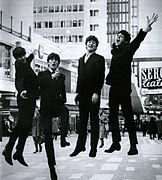Artificial intelligence, or AI, has staged itself in the spotlight of the tech industry this year, and the hype – and the controversy– around it only seems to be growing. The mixed feelings about AI’s growing contribution in the media industry are paralleled in the feelings around its contribution in the music industry.
When talking about AI in the music industry, most people reference silly covers, such as Drake covering “WAP,” or Eric Cartman from “South Park” singing “Bring Me To Life.” But with the release of The Beatles’ last song “Now and Then” on Nov. 2, the reputation around the relationship between AI and music is beginning to change.
Beatles fans have mixed feelings on the topic, as Reddit user u/redfieldp displays in a post on r/TheBeatles saying, “I watched the short documentary last night, and it’s super clear that AI was not used to generate vocals at all.” They continued, “I get that there’s a lot of AI hype/paranoia right now, but it rubs me the wrong way that people are implying this isn’t a ‘real’ John vocal.”
Sheryl Crow doesn’t seem to be a fan of the use of AI in the song, as TMZ writes she said that, “AI has gotten so good at recreating an artist’s voice and style that it’s disturbing” during her appearance on “The Tonight Show with Jimmy Fallon” on Nov. 2.
In a documentary uploaded to The Beatles’ website and YouTube channel, Paul McCartney reveals that in 1994, Yoko Ono, the late John Lennon’s wife, revealed to him that she dug up an old demo tape of Lennon’s. McCartney, Ringo Starr and the late George Harrison developed the song in the 90’s and recently used AI to enhance Lennon’s vocals as it finished production.
The song has been long awaited, though. McCartney teased the song in June on BBC radio 4, announcing that they would be using AI software to bring out Lennon’s vocals from the demo tape, which was recorded before Lennon’s death in 1980.
“We were able to take John’s voice and get it pure through this AI, so that then we could mix the record as you would normally do,” McCartney said.
The song is a beautiful third addition and conclusion to the former released demos of Lennon’s “Free As a Bird” and “Real Love,” which were put out in 1996 as parts of “The Beatles Anthology.” Harrison’s vocals and guitars were recorded in 1995, only six years before his death in 2001 were integrated into the song, the younger, stuck-in-time vocals of the former band members melding beautifully with McCartney’s.
AI can do more than just enhance dead artist’s decades-old demos, though.
Over the Bridge, an organization that focuses on mental health in the music community, released an album called “Lost Tapes of the 27 Club” in 2021 which consists of songs by late musicians curated by AI. The album contains music projecting the voices of Amy Winehouse, Kurt Kobain, Jimi Hendrix and more. Their goal was to use AI software to “imagine what these artists might have created, were they still with us.”
Producers and musicians are increasingly using technology and AI to enhance and revive the work of late musicians. Producer Rodney Jerkins used AI to pull a snippet of Wu Tang Clan’s “Dirty ‘Ol Bastard” off an old VHS tape and sample it into SZA’s hit album “SOS.”
With The Beatles’ last song “Now and Then,” producers are likely to follow in producer Giles Martin’s footsteps. Rather than making silly covers of 21 Savage singing Olivia Newton-John’s hits from Grease, it can bring life to musicians whose art was put on what was once a permanent hold.
Samantha Craddock can be reached at [email protected].




















Alexis • Nov 19, 2023 at 10:13 pm
Wow! Love this! So informative! Great!
Linda • Nov 15, 2023 at 12:07 pm
Hey, well written article on AI the belief around it does make nervous